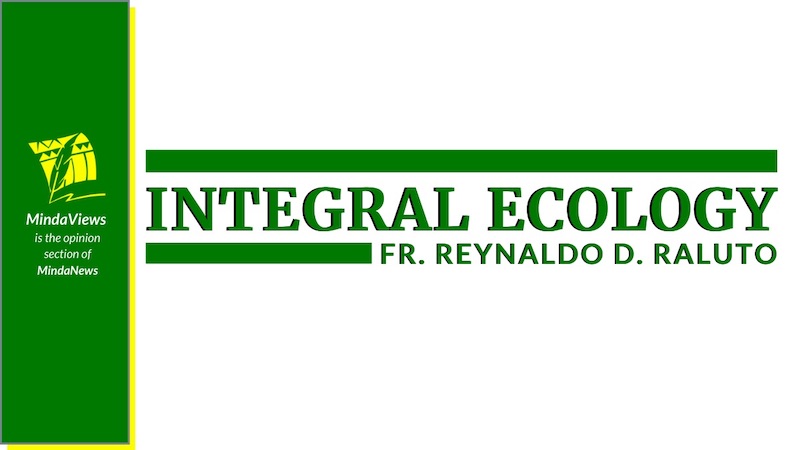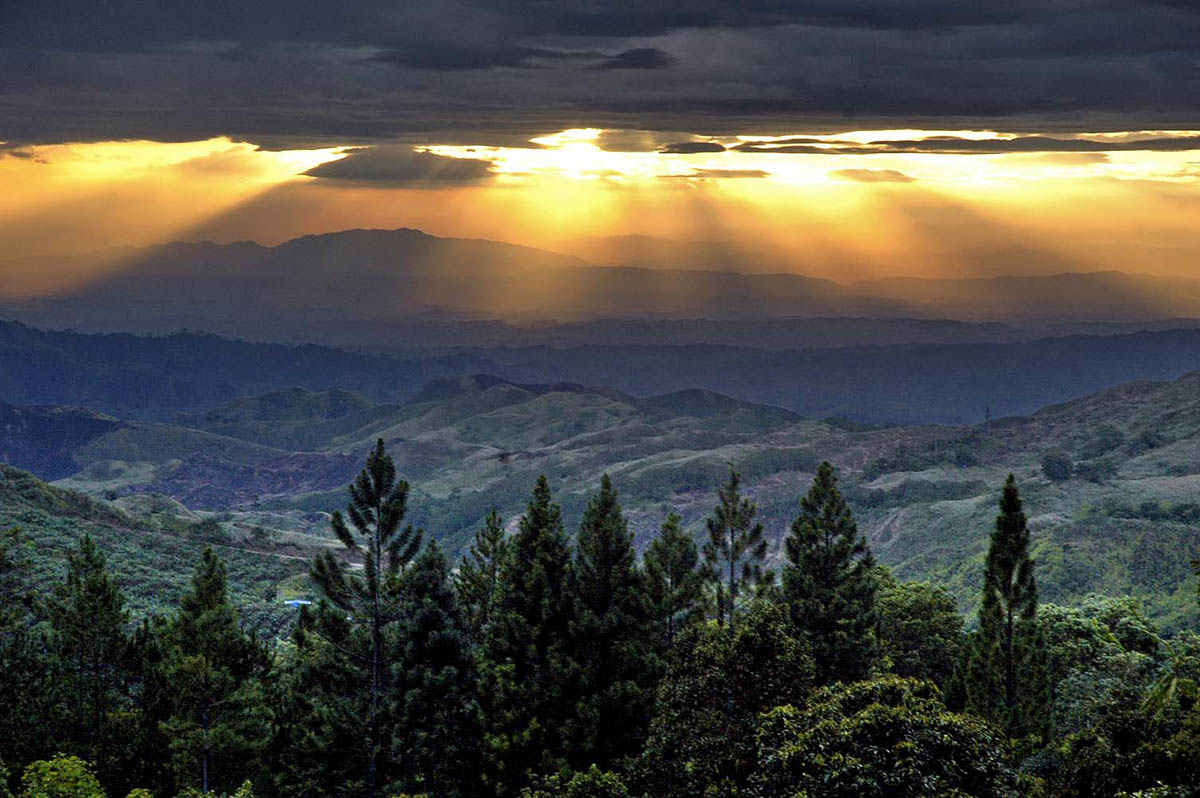
CAGAYAN DE ORO CITY (MindaNews / 03 October) — Every October 4, we celebrate the feast of St. Francis of Assisi (1181/1182-1226) who is known for calling all creatures as our brothers and sisters. His Canticle of Brother Sun, for instance, praises the Lord “for our Sister, Mother Earth, who nourishes and governs us, and produces different fruits with colored flowers and herbs.” Can this language of kinship with the Earth be understood literally or is it to be interpreted metaphorically? Let me explore some answers to this question in this article.
The Mystical Experience of St. Francis
St. Francis’s intuition of the universal kinship with all creatures was borne out of his mystical experience that all of us, including the most insignificant creatures, came from God — our common Source. His great disciple Saint Bonaventure (1221-1274) tells us that, “from a reflection on the primary source of all things, filled with even more abundant piety, he would call creatures, no matter how small, by the name of ‘brother’ or ‘sister’” (cf. LS 11).
To call other creatures — both animate and inanimate — as brothers and sisters with their capacity to praise God can radically change our attitudes toward them. As the American historian Lynn T. White, Jr (1907-1987) put it, for St. Francis, “the ant is no longer simply a homily for the lazy, flames a sign of the thrust of the soul toward union with God; now they are Brother Ant and Sister Fire, praising the Creator in their own ways as Brother Man does in his.”[1] This recognition of the universal fraternity of all creatures reveals St. Francis’s anticipation of the fulfilment of creation in God’s Kingdom.
The Patron Saint of Ecological Brotherhood/Sisterhood
In his Apostolic Letter Inter Sanctos (1979), Pope John Paul II declared St. Francis the “celestial patron of ecologists,” who is known for his “genuine and deep respect for the integrity of creation.” He invited us to imitate the Franciscan “sense of ‘fraternity’ with all those good and beautiful things which Almighty God has created.”[2] He rightly noted that our sense of kinship with other creatures will overcome our tendency to exaggerate human dominion over other creatures as if they exist solely for human interest.

Following his predecessor, Pope Francis in his Laudato Si’ (LS) affirms that we need to reappropriate St. Francis’s sense of kinship with all creatures if we want to liberate the Earth from the ongoing ecological injustices and unsustainable practices. In his words, “if we no longer speak the language of fraternity and beauty in our relationship with the world, our attitude will be that of masters, consumers, ruthless exploiters, unable to set limits on their immediate needs” (LS 11). Our sense of kinship pushes us to reject “every tyrannical and irresponsible domination of human beings over other creatures” (LS 83).
Retrieving the Biblical Basis of Our Kinship with Creation
The book of Genesis narrates that “the Lord God formed the man out of the dust of the ground and blew into his nostrils the breath of life” (Gen 2:7). It is significant to note that the Hebrew word for “human” is adam and for the ground or soil is adamah. Thus, adam (human) was formed out of adamah (dust of the ground). This play of words reminds us of human beings’ humble origin from the ground and they will “return to the ground” (Gen 3:19) when they die, waiting to be resurrected.
The biblical story of creation also tells us about our ground-based kinship with plants and animals: “out of the ground the Lord God made grow every tree that was delightful to look at and good for food…” (Gen 2:9); “out of the ground [the Lord God formed] all the wild animals and all the birds of the air” (Gen 2:19). Our kinship with creation will find its fulfilment in the eschatological future. The whole creation shares in the hope of the final coming of God’s kingdom (cf. Rom 8:21-25) when God will “make all things new” (Rev 21:5).
What can Science Offer to Our Reflection on Universal Kinship?
In 1988, John Paul II raised a question in the context of the ongoing interdisciplinary dialogue between science and religion: “might contemporary cosmology have something to offer to our reflections upon creation? Does an evolutionary perspective bring any light to bear upon theological anthropology?”[3]
The contemporary cosmological theory affirms that all things in our expanding universe had originally co-existed together and compressed into an inconceivably tiny fireball that exploded 13.7 billion years ago. This theory of our common origin supports Charles Darwin’s findings that “all living things have much in common, in their chemical composition, their germinal vehicles, their cellular structure, and their laws of growth and reproduction.”[4] This finding led Darwin to conclude that all living creatures have ancestors in common.
Along this line, the distinguished Irish scientist, John Feehan, explained that “all living things are related in the most literal genetically-based way.” He showed that human beings have a certain degree of genetic affinity with other living creatures: “Only 22% of vertebrate genes are not found in worms or flies; 60% of our genes are shared with rodents, 40% with insects, 40% with nematodes; we share one-third of our genes with plants. We are only 1% different from chimps genetically, 223 of our genes were acquired directly from bacteria.” In this light, Feehan remarked that “the language of St. Francis is not a metaphor: We are all brothers and sisters.”[5]
Analyzing the Language of Kinship in Laudato Si’
Although Laudato Si’ does not use the term evolution in the text, it can be shown that this encyclical is open to an evolutionary vision when it describes the universe as “shaped by open and inter-communicating systems” (LS 79). It also quotes the Christological insights of Pierre Teilhard de Chardin (see # 83), a Jesuit paleontologist who is known for his evolutionary view of the universe. In any case, this encyclical may be interpreted as critically appropriating the contemporary cosmological theory which understands kinship in an evolutionary perspective.
Moreover, this encyclical has several lines that describe our kinship with other creatures in evolutionary language. For instance, it affirms “that we ourselves are dust of the earth (cf. Gen 2:7); our very bodies are made up of her elements” (LS 2). It also acknowledges that “a good part of our genetic code is shared by many living beings” (LS 138). It envisions creation as forming “a kind of universal family” (LS 89) and a sort of “universal fraternity” (LS 228). Are not these descriptions sufficient to affirm that Laudato Si’ appropriates the contemporary biological theory of kinship?
Distorted Kinship with Other Creatures
To retrieve the importance of our kinship with other creatures is to remind us that it is not enough to affirm that we reflect the likeness of God (Gen 1:26). This is also to remind us to equally recognize our likeness with other creatures. Affirming these two dimensions of likeness leads us to a balanced view of ourselves both in relation to God and to our fellow creatures.
Recognizing our kinship with plants and animals should not diminish our sense of kinship with fellow human beings. Pope Francis strongly warns us “not to put all living beings on the same level nor to deprive human beings of their worth” (LS 90). His predecessor also reminds us to avoid considering “nature as more important than the human person.”[6] Thus, it would be unethical to show our kinship with pets and ornamental plants and yet we remain blind to the marginalization and impoverishment of the most complex of creation—the human beings.
(MindaViews is the opinion section of MindaNews. Reynaldo D. Raluto is a Roman Catholic priest of the Diocese of Malaybalay. He is the Academic Dean of St. John Vianney Theological Seminary in Cagayan de Oro where he also teaches fundamental/systematic theology and Catholic social teaching. He is the author of Poverty and Ecology at the Crossroads: An Ecological Theology of Liberation in the Philippine Context (Quezon City: Ateneo de Manila University Press, 2015). His ecological advocacy includes planting/growing Philippine native trees, mountain climbing, and defending the rights of Indigenous Peoples.]
[1] Lynn White, Jr., “The Historical Roots of our Ecological Crisis,” in Ian Barbour, ed., Western Man and Environmental Ethics: Attitudes Towards Nature and Technology (Reading Mass.: Addison-Wesley, 1973), 18-30, on p. 28; originally published in Science 155 (1967): 1203-1207.
[2] John Paul II, Peace with God the Creator, Peace with All of Creation (January 1, 1990), no. 16; available online: http://www.vatican.va/content/john-paul-ii/en/messages/peace/documents/hf_jp-ii_mes_19891208_xxiii-world-day-for-peace.html (accessed: January 25, 2009).
[3] John Paul II, “Message of His Holiness John Paul II: To the Reverend George V. Coyne, S.J., Director of the Vatican Observatory” (June 1, 1988); available online: http://www.vatican.va/content/john-paul-ii/en/letters/1988/documents/hf_jp-ii_let_19880601_padre-coyne.pdf (accessed: January 26, 2010).
[4] Charles Darwin, The Origin of Species [1859], with Introduction by Jeff Wallace (Hertfordshire: Wordsworth Editions Limited, 1998), 364
[5] John Feehan, The Singing Heart of the World: Creation, Evolution and Faith (Dublin: The Columba Press, 2010), 55, 57.
[6] Benedict XVI, Caritas in Veritate: On Integral Human Development in Charity and Truth (29 June 2009), no. 48; available from http://www.vatican.va/holy_father/benedict_xvi/encyclicals/documents/hf_ben-xvi_enc_20090629_caritas-in-veritate_en.html (date accessed: 16 December 2009).






